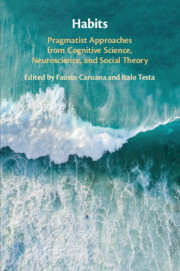Book contents
- Habits
- Habits
- Copyright page
- Contents
- Contributors
- The Pragmatist Reappraisal of Habit in Contemporary Cognitive Science, Neuroscience, and Social Theory: Introductory Essay
- Part 1 The Sensorimotor Embodiment of Habits
- Part II The Enactment of Habits in Mind and World
- 7 The Backside of Habit
- 8 Habit, Ontology, and Embodied Cognition Without Borders
- 9 Clarifying the Character of Habits
- 10 Habits, Meaning, and Intentionality
- 11 Language, Habit, and the Future
- 12 Moral Habit
- 13 Habits of Goodness
- Part III Socially Embeddded and Culturally Extended Habits
- Index
- References
9 - Clarifying the Character of Habits
Understanding What and How They Explain
from Part II - The Enactment of Habits in Mind and World
Published online by Cambridge University Press: 24 November 2020
- Habits
- Habits
- Copyright page
- Contents
- Contributors
- The Pragmatist Reappraisal of Habit in Contemporary Cognitive Science, Neuroscience, and Social Theory: Introductory Essay
- Part 1 The Sensorimotor Embodiment of Habits
- Part II The Enactment of Habits in Mind and World
- 7 The Backside of Habit
- 8 Habit, Ontology, and Embodied Cognition Without Borders
- 9 Clarifying the Character of Habits
- 10 Habits, Meaning, and Intentionality
- 11 Language, Habit, and the Future
- 12 Moral Habit
- 13 Habits of Goodness
- Part III Socially Embeddded and Culturally Extended Habits
- Index
- References
Summary
This chapter aims to set the record straight about a special sort of intelligence exhibited by habitual doings. It defends an enactivist account of habitual doings which, at its core, depicts habits as flexible and adjustable modes of response that are world directed and context sensitive. So understood, habits are wholly unlike the exercise of blind mechanisms or mindless reflexes. Nevertheless, we resist the familiar forced choice of thereby understanding habits in standard cognitivist terms. Our proposal aims to avoid the twin mistakes of either underintellectualizing or overintellectualizing habits. In tune with our enactivist elucidation of the core character of habits, the chapter also explicates how habits, so conceived, can support and thwart our larger projects.
- Type
- Chapter
- Information
- HabitsPragmatist Approaches from Cognitive Science, Neuroscience, and Social Theory, pp. 204 - 222Publisher: Cambridge University PressPrint publication year: 2020
References
- 9
- Cited by



